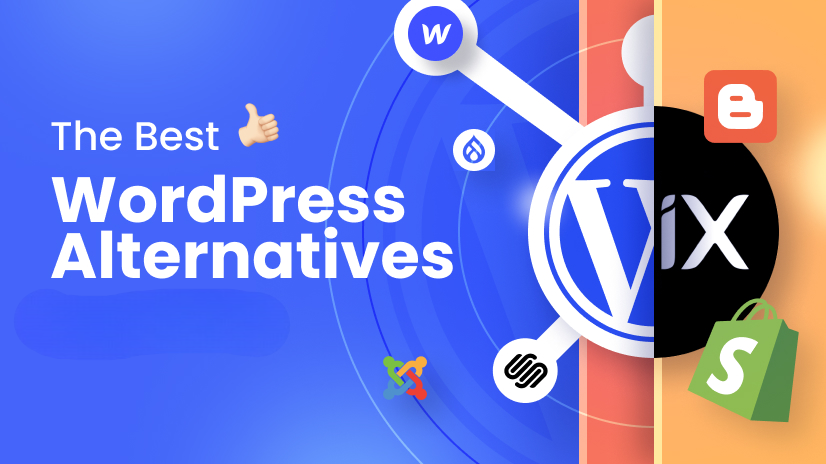
WordPress Alternatives: Top Platforms to Build Stunning Websites (With Full Comparison)
WordPress Alternatives: Top Platforms to Build Stunning Websites (With Full Comparison)
WordPress is undoubtedly one of the most popular content management systems (CMS) in the world. But it’s not the only option. Whether you’re looking for more simplicity, flexibility, or a platform that better suits your specific goals, there are many alternatives worth exploring.
In this article, we’ll review the best WordPress alternatives, compare their features, ease of use, pricing, and ideal use cases — so you can confidently choose the best platform for your website.
📋 Top WordPress Alternatives
- Wix
- Webflow
- Squarespace
- Shopify
- Ghost
- Joomla
- Drupal
🔍 Quick Comparison Table
| Platform | Ease of Use | Design Flexibility | eCommerce Support | Starting Cost | Best For |
|---|---|---|---|---|---|
| Wix | ⭐⭐⭐⭐⭐ | ⭐⭐⭐⭐ | ⭐⭐⭐⭐ | Low | Beginners & small businesses |
| Webflow | ⭐⭐⭐⭐ | ⭐⭐⭐⭐⭐ | ⭐⭐ | Medium | Designers & developers |
| Squarespace | ⭐⭐⭐⭐ | ⭐⭐⭐⭐ | ⭐⭐⭐⭐ | Medium | Creatives & visual brands |
| Shopify | ⭐⭐⭐⭐⭐ | ⭐⭐⭐ | ⭐⭐⭐⭐⭐ | Medium–High | Online stores |
| Ghost | ⭐⭐⭐ | ⭐⭐⭐ | ⭐⭐ | Low–Medium | Blogs & publications |
| Joomla | ⭐⭐ | ⭐⭐⭐⭐ | ⭐⭐⭐ | Free | Advanced developers |
| Drupal | ⭐ | ⭐⭐⭐⭐⭐ | ⭐⭐⭐⭐ | Free | Large-scale & custom projects |
🧱 1. Wix
A cloud-based website builder with drag-and-drop functionality.
- Pros:
- No coding needed
- Hundreds of beautiful templates
- Built-in blogging & eCommerce tools
- App marketplace
- Cons:
- Limited advanced customization
- Migration to other platforms is difficult
🎨 2. Webflow
A powerful tool for designers to build custom, professional websites.
- Pros:
- Full control over layout, CSS & animations
- Built-in CMS and hosting
- Ideal for portfolios & agencies
- Cons:
- Steeper learning curve
- May be too complex for casual users
🧳 3. Squarespace
An all-in-one platform for elegant and visual websites.
- Pros:
- Stunning templates
- Built-in SEO, email marketing, and eCommerce
- Great support
- Cons:
- Limited code-level customization
- Less flexible than WordPress in the long run
🛒 4. Shopify
The go-to platform for building professional online stores.
- Pros:
- Built specifically for eCommerce
- Easy inventory, payment, and shipping tools
- Rich app ecosystem
- Cons:
- Not suitable for non-commerce websites
- Monthly plans can be pricey
✍️ 5. Ghost
An open-source platform focused on content and publishing.
- Pros:
- Clean, distraction-free writing experience
- Super fast and lightweight
- Membership and subscription features built-in
- Cons:
- Not ideal for complex or multi-page sites
- Requires hosting setup (unless using Ghost(Pro))
🧑💻 6. Joomla & 7. Drupal
Robust, open-source CMS platforms built for scalability and flexibility.
- Pros:
- Total control over website structure
- Multilingual and multisite support
- Ideal for custom or enterprise websites
- Cons:
- Technical knowledge required
- Longer development and maintenance time
🥇 Which Platform Should You Choose?
| Use Case | Best Option |
|---|---|
| Simple or personal website | ✅ Wix or Squarespace |
| Highly customized design | ✅ Webflow |
| Professional blogging platform | ✅ Ghost |
| Full-featured eCommerce store | ✅ Shopify |
| Government or enterprise site | ✅ Drupal |
| Flexible and scalable CMS | ✅ WordPress (still king here) |
✅ Final Thoughts
While WordPress remains a top-tier option for flexibility and control, platforms like Wix, Webflow, Squarespace, Shopify, and Ghost offer excellent alternatives depending on your needs.
Choosing the right platform depends on your technical skill level, site goals, and budget.


